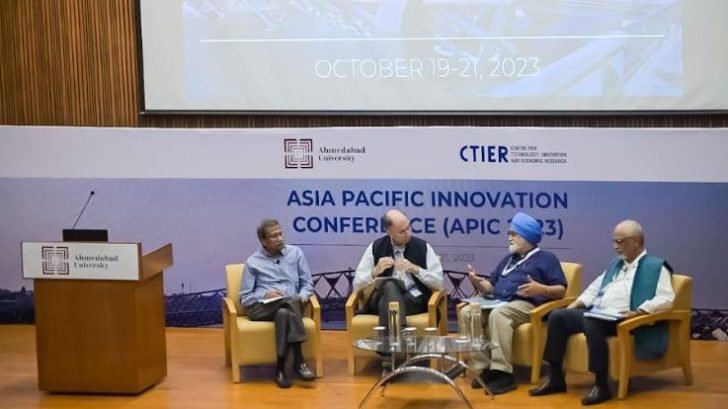Global crises, such as climate change, pandemic, urbanisation and many others, require deep science and technology interventions. This is a moment for Indian Science to play a significant role at the global scale. It would require deep scientific capabilities, building our science infrastructure to meet these requirements and investments by both government and industry in the national innovation system.
T N Ninan, Montek Singh Ahluwalia, Naushad Forbes, and Pankaj Chandra (from right) during the inaugural panel discussion of the Asia-Pacific Innovation Conference 2023 held at Ahmedabad University
The Centre for Technology Innovation and Economic Research (CTIER) and Ahmedabad University jointly organised the 13th Asia-Pacific Innovation Conference from October 19-21, 2023.
At the inaugural panel discussion of the Conference, held at Ahmedabad University, on the Need for Indias 1991 Moment for Science and Technology Reform, Naushad Forbes, chair of the panel, talked about whether Indias national innovation system is on the cusp of a change and why investment in research, development, and innovation must greatly matter to India. The panellists were Montek Singh Ahluwalia, a key figure in Indias economic policy and reforms since the 1980s and the former Deputy Chairman of the Planning Commission of India; T N Ninan, one of Indias leading commentator on the Indian Economy and the former Chairman of Business Standard Limited; and Pankaj Chandra, Vice Chancellor, Ahmedabad University.
Dr Forbes, the Co-Chairperson of Forbes Marshall, Member – Board of Governors, Ahmedabad University, and Chairman, CTIER, said in his keynote address, “India has more skill and capital intensive industries than countries with similar per capita GDP. This means our industries must innovate more. Lessons from China and South Korea can help us rapidly deepen our research and restructure our institutions.”
Mr Ahluwalia spoke on the possible watershed movement for Indias research and development in the context of 1991 economic reforms, “In 1991, we had a first-rate microeconomic crisis. People knew that they had to do something different. The government used that public awareness not just to stabilise the economy but also to push through a series of reforms. There was also an awareness that India was falling behind compared to other East Asian countries. This combination led to a deeper set of changes that happened. In research and innovation, we must look at the significant gap between our performance and the rest of the world.” He mentioned that, in Mr Manmohan Singh, the country also had a first rate economist as our Finance Minister.
Regarding whether we can create a science and technology crisis to bring out changes in innovation and research, Mr Ninan said, “We have to differentiate between overt crisis and silent crisis. We dont need to create a crisis because India has several silent crises. For instance, we have gone from water-rich, to water scarce to water scanty, and we use 80 per cent of this water in agriculture, so there is also a need to develop less water-intensive crops. Silent crises like these call for research and innovation driven solutions.”
Professor Chandra emphasised that the Indian higher education system needs dramatic reform – autonomy to make decisions internally, quality science and technology infrastructure in small colleges and state level public institutions, and access to high-quality faculty resources will go a long way in building an environment of excellence in science.
About the Asia Pacific Innovation Conference
The Asia Pacific Innovation Conference was formed in January, 2010, to bring together scholars in the Asia Pacific region interested in the Legal, Managerial and Economic aspects of innovation. They conference conduct regular workshops, conferences, and events in the region focusing on research in innovation.
About Centre for Technology Innovation and Economic Research (CTIER)
CTIER, based in Pune, has been incorporated under Section 8 of the Companies Act, 2013 in India. CTIER is completely autonomous and works with some of India’s leading industry and academic experts in the field of innovation and technology policy. It aims to facilitate high quality economic research, provide a platform to inform policy making and impact higher education in India.
About Ahmedabad University
Ahmedabad University is a leading private, non-profit research university offering students a liberal education focused on interdisciplinary learning, practice orientation, and research thinking.
The University has been
Recognised by the Government of Gujarat as a Centre of Excellence.
Accredited with A grade by the National Assessment and Accreditation Council (NAAC).
Awarded a 5-star rating, the highest awarded in the Gujarat State Institutional Rating Framework (GSIRF) for 2021-22 by the Knowledge Consortium of Gujarat (KCG), Department of Education, Government of Gujarat.
Recognised by the UGC under section 12(B) of the UGC Act, becoming one of the very few private research universities to have been awarded this recognition for select research universities.
Recognised as a Highly Commended University for Teaching and Learning Strategy of the Year in the Times Higher Education (THE) Awards Asia 2023.
Awarded the AACSB’s Innovations That Inspire Award 2023 for its Foundation Programme.
Awarded Gold Rating by the Indian Green Building Council for achieving the Green Building Standards at our University Centre.
The University, established in 2009, is rooted in the vision of one of India’s finest educational foundations, the Ahmedabad Education Society, which was founded in 1935 by nationalist leaders. Programmes at the University range from bachelors to doctoral levels in humanities and social sciences, natural sciences, engineering, and management through its 11 Schools and Centres:
Amrut Mody School of Management | School of Arts and Sciences | School of Engineering and Applied Science | School of Public Health | Centre for Heritage Management | International Centre for Space and Cosmology | VentureStudio | Centre for Learning Futures | Global Centre for Environment and Energy | Centre for Inter-Asian Research | Ahmedabad Design Lab
An urban university, Ahmedabad promotes independent-mindedness and diversity across all dimensions of its activity and helps students mature into critical thinkers who are analytically equipped, practically oriented, and contextually aware global citizens. The University provides a contemporary educational framework that brings liberal arts, sciences, and the professions to engage together in creating new knowledge for addressing complex challenges of the society and in offering majors that merge the boundaries of disciplines to prepare students for the new economy.

